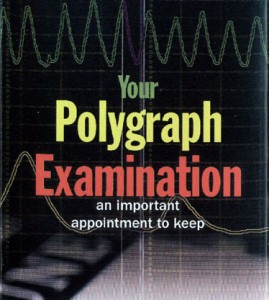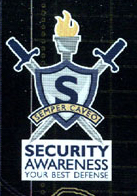
AntiPolygraph.org has obtained a copy of an NSA leaflet (1.7 mb PDF) titled, “Your Polygraph Examination: An Important Appointment to Keep.” This leaflet, which has blanks for filling in the time, date, and place of an appointment, merits some discussion.
The leaflet begins with a section on what to do before the polygraph:
Prior to Your Appointment
- Get a good night’s sleep
- Follow your usual routine
- Take your regular medications
- Don’t skip any meals
- Come in with an open mind
- It’s a unique experience each time
- Allow enough time in your schedule
This much is fairly uncontroversial. But while the NSA urges keeping an “open mind” about the polygraph, we should also heed evolutionary biologist Richard Dawkins’ wise counsel: “By all means let’s be open-minded, but not so open-minded that our brains drop out.” The National Academy of Sciences in 2002 found polygraph screening to be completely invalid, concluding that “its accuracy in distinguishing actual or potential security violators from innocent test takers is insufficient to justify reliance on its use in employee security screening in federal agencies.”
Test Requirements
- Questions are directly related to counterintelligence and suitability
- Examinee must be in good physical and mental health
- Test is voluntary and can be terminated at any time
- Examinee must sign an interview consent form
- All questions are reviewed prior to testing
While the leaflet states that “questions are directly related to counterintelligence and suitablity,” those facing NSA polygraph screening need to know that they face a wide-ranging interrogation that may delve into any facet of their personal lives. For example, you may be asked if you’ve viewed Internet pornography. If the answer is “yes,” you may then be interrogated about whether you’ve ever viewed explicit images of minors.
In addition, the polygraph is not truly voluntary. It’s mandatory for NSA employees and contractors. The polygraph is only “voluntary” in the sense that choosing to work for the NSA is voluntary.
The following section attempts to reassure examinees about the qualifications of the NSA’s polygraph operators:
Examiner Training
- Graduates of Defense Academy for Credibility Assessment
- Federally Certified examiners
- All Special Agents
- Bachelor’s Degree (minimum)
- 80 hours of continuing education biennually
What the leaflet doesn’t mention is that the Defense Academy for Credibility Assessment (the polygraph school that trains all federal polygraphers) churns out newly minted polygraph operators after just 14 weeks of training. No science background is required. Indeed, critical thinking about polygraphy is discouraged at DACA, which at one time had (and which may yet have) a tradition whereby students who violate norms (for example, by referring to a polygraph instrument as a “machine”) are required to put money into a coffee can, with amounts collected going toward a party at graduation time.
Most importantly, it should be borne in mind that lie detection, at it’s core, is an exercise in mind reading. And polygraph operators cannot read minds. They’re interrogators who use the polygraph instrument as an adjunct to interrogation.
Health Considerations
The polygraph components are not invasive. The polygraph instrument uses sensors placed on an individual to monitor and record their physiology during the testing phase. It is highly unusual for any medical condition, past or present, to interfere with the polygraph test or polygraph results. In the event an individual does have a concern in this regard, it is recommended that they consult with their physician before their examination is scheduled.
Unfortunately, physicians who consult the medical literature for the contraindications of polygraph testing will come up short. There is scant peer-reviewed research on the effects of any medical conditions or medications on polygraph results. For more on the ethical questions that arise when physicians are consulted regarding a person’s suitability for polygraph “testing,” see Dr. Alan P. Zelicoff’s 2001 letter to the secretary of the New Mexico Board of Medical Examiners.

Before we proceed to the flip side of the brochure, we should note here that nowhere on this leaflet is there any mention of the National Security Agency. Instead, the leaflet bears a strange coat of arms with a shield, torch, crossed swords, and a banner with the motto “Semper Caveo” (Always Beware), plus the slogan: “Security Awareness: Your Best Defense.” A Google search turns up nothing connecting these words to any federal agency.
Turning now the reverse side of the leaflet, we read:
Question Areas
Counterintelligence:
- Espionage
- Sabotage
- Terrorist Activity
- Deliberate damage of U.S. Government Information Systems
- Intentional compromise of U.S. Government Classified Information or Material
- Secret contact with a foreign national or representative
Suitability:
- Involvement in a serious crime
- Personal involvement with illegal drugs during the last seven years
- Deliberate falsification of the security forms
These are legitimate areas of inquiry for those who are to be entrusted with sensitive national security information. Unfortunately, the polygraph is not a legitimate means of determining whether such persons have spoken the truth. The leaflet continues:
Confidentiality:
Your polygraph is held in the strictest confidence. We ask that you maintain confidentiality regarding your polygraph examination and do not discuss it with acquaintances, friends, family, or co-workers.
Unfortunately, the NSA’s promise of confidentiality cannot be taken at face value. Information disclosed to NSA polygraphers may be shared with other federal agencies as well as with local law enforcement agencies. For an example, see the public statement of “Frustrated.”
The NSA’s request that examinees not discuss their experience with others is also noteworthy. While classified information might be discussed in the polygraph suite, the procedure itself is not classified. Indeed, there is little that is secret about polygraphy. It’s methods have been around for decades, and the federal polygraph handbook (964 kb PDF) may be freely downloaded from AntiPolygraph.org. Yet the NSA polygraph unit seeks to preserve the “mystique” of the lie detector by discouraging examinees from talking about it.
Next, the NSA polygraph unit provides a FAQ:
Frequently Asked Questions
Will nervousness affect my test?
Nervousness is expected and accounted for during the test.
While nervousness is indeed expected, it is not truly “accounted for.” The polygraph operator has no way of differentiating the nervousness that goes with having one’s career riding on the outcome of such a pseudoscientific procedure as polygraphy from the nervousness of a liar who fears being caught.
How long will the test take?
The average test length falls between two and four hours. Everyone’s life experience is different and the test length relates directly to those experiences. Leave enough time in your schedule for your test.
This much is true.
How can I be successful on my polygraph examination?
Speak candidly about your life experineces, ask questions, follow your examiner’s instructions, and maintain your focus throughout the process.
Actually, there is no clear correlation between candor and passing the polygraph. The polygraph does not detect lies. It’s used by the NSA as an interrogational prop to elicit admissions.
What about the information I read on the Internet about the polygraph process?
There is a great deal of unverified information on the Internet about polygraph. Talk to your examiner about the information you read.
Not a very satisfactory answer. The scientific shortcomings of polygraphy are well documented, and the kind of people the NSA wants to hire (mathematicians, scientists, engineers, computer programmers, etc.) can easily learn about these shortcomings via the Google. (AntiPolygraph.org is currently the 2nd result returned when one searches Google for “polygraph.”)
Polygraph operators tend to be suspicious and untrusting of those who question what they do for a living. Unfortunately, telling your polygrapher that you’ve read sites like AntiPolygraph.org will have the predictable result of biasing your polygrapher against you, inviting an arbitrary accusation of deception and/or countermeasure use.
What about the things my co-workers told me?
Everyone’s polygraph interview is different. Don’t let what they tell you color your experience.
Why not? Isn’t it foolish to dismiss out of hand the experiences of others? In addition to the public statement of “Frustrated” mentioned earlier, see also the statements of Nate B., “NSA Reject,” “An Anonymous Applicant,” and the pseudonymous Ralph J. Perro’s essay, “Interviewing with an Intelligence Agency, (Or, a Funny Thing Happened on the Way to Fort Meade)” (PDF).
Will I feel the components during testing?
Yes, the components are attached snugly to the body. If you feel any discomfort, inform your examiner.
Fair enough. Sometimes, polygraphers inflate the blood pressure cuff to the point where it causes physical pain.
Will my examiner tell me the test results?
No. Every test we conduct goes through a quality control process. Only after that quality control process is completed can we provide official results.
This answer is not entirely true. Those facing NSA polygraph screening should not expect to hear the words, “Congratulations, you passed!” But if they don’t pass, they can expect to be accused of deception and to be badgered for admissions. It is common for NSA applicants to be subjected to as many as three polygraph sessions before being “cleared.”
What should I do if I don’t understand something?
Don’t be afraid to ask questions. Your examiner has in-depth knowledge about the testing process. It is vital to your success that you understand the process and the questions.
If you don’t understand why the NSA relies on polygraph screening despite the longstanding scientific consensus that polygraphy has no scientific basis, and if you have the audacity to ask your polygraph operator about this matter, we’d be interested to know the answer you receive.
A polygraph test is just a test on how nervous you are. It has nothing to do with what is true an what is not.
A pathological lier can fool a polygraph. So thus a person that lives in a fantasy world. So will the 10% of the population that are psychopaths. And an innocent person can fail the test just because it was nervous. Did you kill your wife, will always have a nervous response. Whenever you kill her, or not.
Around July 2008 I was offered a position with a consultant firm with the NSA providing I passed a top secret clearance background investigation and a poly.
After 14 months of waiting, I passed the Top secret clearance and was called in again for a poly. During the NSA poly I failed the questions about turning over confidential information to foreign agents and doing serious crimes (such as murder). I was surprised that after a lengthy background investigation that they could fail those two questions.
Now three months later after I spend a week’s bicycle vacation in the Netherlands, I received a notice from the contractor about taking the poly again. They tested me not only for the failed questions, but also for drugs. After two hours, I was told that I lied about something. I said that I did not. Then the investigator insisted that I was weak and used drugs in the Netherlands and unless I confessed, I would not have a clean poly which would be worse than to confess that I did. She also implied that if I confessed, I would pass the poly and most likely be hired for the position. Logically it appeared that it was better to pretend that I took drugs than to fail the previous questions. Therefore I agreed to lie to pass the poly. As a result I was rejected for telling the truth (taking drugs where it is legal) and for lying about the taking of drugs before I did during the previous test (for something it was agreed I did not do).
I took the Poly 7 times and each time I progressed and was asked back. The last time, the polygrapher was hostile toward me and cut the poly short rushing me out the door. Ive never used drugs in my life but he believed otherwise. Failing for telling the truth sucks. I have no respect for the poly.